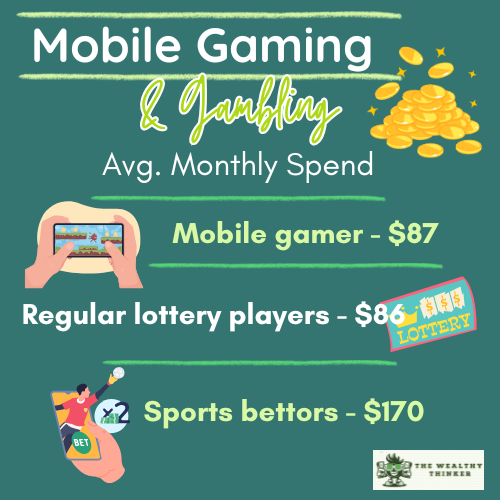Ever dropped $5 on a scratch ticket while grabbing your morning coffee?
Or found yourself tapping “purchase” for those special gems in your favorite mobile game? Congratulations – you might be gambling without even realizing it.
When we think of gambling addiction, our minds jump to casino floors and poker tables.
But the truth?
Gambling has infiltrated our daily lives in sneaky ways that can drain our wallets before we even notice.
Let’s pull back the curtain on how companies have mastered the art of separating us from our money through gaming and gambling mechanics – and what we can do about it.

The Lottery Illusion: Small Costs, Big Dreams
That weekly lottery ticket might seem harmless.
After all, what’s $5 for the chance to quit your job and buy a private island? But those small purchases add up faster than you might think.
The average lottery player spends around $1,000 a year – that’s $19 weekly on what essentially amounts to expensive paper.
To put that in perspective, that same $1,000 invested annually with a modest 7% return could grow to over $100,000 in 30 years.
But the dream of instant millions keeps us coming back, despite odds so astronomical (1 in 292 million for Powerball) that you’re more likely to be struck by lightning… twice.
Why do we keep playing? Because our brains are wired for hope and possibility, not statistical reality.
Each ticket is a permission slip to daydream about a different life, if only for a few days until the drawing crushes our fantasies once again.
Your Phone: The Casino in Your Pocket
Remember when phones were just for calling people?
Now that innocent device in your hand might be the most effective online gaming and gambling machine ever created.
Take “gacha” games like Genshin Impact or loot boxes in games like FIFA. These seemingly innocent games use the same psychological triggers as slot machines – the anticipation, the flashy rewards, the near-misses that keep you pulling the digital lever “just one more time.”
These games are technically “free-to-play,” but they’re engineered to be anything but free.
The industry has a nickname for their biggest spenders: “whales.” These power users (less than 5% of players) generate over 50% of mobile game revenue.
Some individuals spend thousands – even tens of thousands – chasing digital rewards with no real-world value.
What makes it so effective?
The spending happens in tiny increments. It’s not $1,000 at once; it’s $4.99 here, $9.99 there. Before you know it, you’ve spent more on colorful pixels than you did on your actual monthly grocery bill.
The Gaming and Gambling Psychology: How They Keep You Hooked
Companies have become masters at exploiting our brain chemistry, particularly our relationship with dopamine – the “feel-good” chemical that floods our brain when we experience something rewarding.
That “almost won” feeling when your lottery numbers were just one digit off? That’s by design.
Those limited-time offers that create FOMO? Intentional.
The satisfying animation when you open a loot box? Carefully crafted to keep you coming back.
Even non-gaming apps use these tricks. Notice how your shopping apps reward you for “streaks” or give you badges for making purchases?
Or how trading apps shower you with confetti when you make a trade? That’s gamification – turning regular activities into addictive games that encourage you to spend more.
The Psychology of Money: 4 Ways to Understand & Improve Your Relationship with Money
The Numbers Don’t Lie: What We’re Really Spending
If you’re thinking, “This doesn’t apply to me – I only spend a few dollars here and there,” you might be surprised by the reality. Let’s break it down:
- The average mobile gamer who makes purchases spends $87 monthly
- Regular lottery players spend around $86 monthly
- Sports bettors average $170 monthly on their habit
Those “microtransactions” don’t seem so micro when you add them up, do they?
15 Things You Need to Stop Wasting Money on Right Now
Taking Back Control: 4 Practical Steps
Here’s the good news: once you recognize these tactics, they lose some of their power over you. Here’s how to regain control:
Track Your Real Spending
Go through your bank statements for the last three months and highlight every gambling-related expense – lottery tickets, in-app purchases, sports betting, everything. The total might shock you.
Set Hard Limits
Decide in advance what you’re willing to spend on these activities monthly. Many games and platforms allow you to set spending limits – use them! Some banks even offer tools to restrict gambling-related transactions.
Recognize Your Triggers
Do you buy lottery tickets when you’re feeling financially stressed?
Do you make in-app purchases when you’re bored?
Understanding your triggers helps you create healthier responses.
Find the Real Value
Ask yourself: What could I do with this money instead? That $1,000 annual lottery habit could be a weekend getaway, an emergency fund starter, or a significant investment in your future.
Squid Game and Gambling: 5 Unexpected Lessons in Financial Literacy
When Fun Becomes a Problem
If you’re reading this and recognizing some concerning patterns in your own behavior, remember that help is available.
The National Problem Gambling Helpline (1-800-522-4700) offers support 24/7, and organizations like Gamblers Anonymous provide community and resources for recovery.
There’s no shame in admitting that these cleverly designed systems have affected you – they’re literally engineered to be addictive.
Gaming and Gambling: The Bottom Line
Gambling isn’t inherently evil, and there’s nothing wrong with occasionally playing the lottery or making an in-app purchase if it brings you joy and fits within your budget.
The key is awareness and intention.
The next time you feel the urge to tap “purchase” on that special offer or buy an extra scratch ticket, pause and ask yourself:
“Am I in control of this decision, or is it controlling me?”
By understanding the psychological tactics at play, we can enjoy gaming and gambling activities mindfully – ensuring that what should be simple entertainment doesn’t transform into a financial burden that compromises our future.















